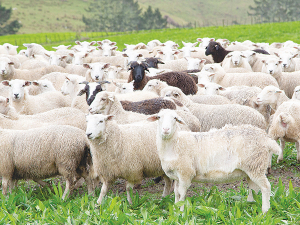Editorial: Happy days
OPINION: The year has started positively for New Zealand dairy farmers and things are likely to get better.
 Sheep with finer wool, greater tolerance for hot weather, top meat quality traits, as well as lower methane emissions is the goal behind the ‘Sheep of the Future’ programme.
Sheep with finer wool, greater tolerance for hot weather, top meat quality traits, as well as lower methane emissions is the goal behind the ‘Sheep of the Future’ programme.
Sheep with finer wool, greater tolerance for hot weather, top meat quality traits, and lower methane emissions.
That is the vision for Pāmu and its partners who are working on advancing sheep genetics. Pāmu (Landcorp Farming Ltd), the Ministry for Primary Industries (MPI) and Focus Genetics, a Pamū subsidiary, with support from AgResearch, have joined forces on the ‘Sheep of the Future’ programme.
The programme includes finer wool genetics (20-25 micron) sheep that can be farmed beyond the arid areas that have traditionally been the home for Merinos. It also aims for advances in strong wool breeds to increase disease tolerance, low-input traits to make farming less costly, continued breeding selection for animal growth and meat quality traits, and for rumen function with lower levels of methane emission.
The seven-year initiative aims to transform NZ’s sheep-based production systems.
Programme manager Natalie Pickering, from Focus Genetics, says climate change is likely to have a marked impact on NZ farms producing wool and red meat.
“Genetics provides an opportunity to select animals that are better adapted to the changing environment through disease and heat tolerance while maintaining productive performance and lowering emissions.”
The project, partially funded through the Sustainable Food and Fibre Futures fund, is expected to run until 2029. The collaboration will see an injection of $10.5 million – which will enable benchmarking, breed comparisons, research on new traits and breeding programmes to develop fine-wool and no-wool sheep in New Zealand.
At Pāmu’s Aratiatia farm, near Taupō, the team is working with a fine-wool breeding flock alongside a control Romney line. Measurements for production, reproduction, survival, disease and fine-wool attributes are being conducted, along with environmental assessments. The objective is to identify fine-wool attributes suitable for a temperate environment.
“Working with Dr Tricia Johnson, team leader animal genomics at AgResearch, we saw an opportunity to generate a resource to enable us to investigate the genetic variation in the no-wool and fine-wool breeds,” Pickering explains.
“AgResearch has done great work on methane, residual feed intake and genomic selection for the New Zealand sheep industry and we can leverage this work.”
The programme also includes a feasibility study led by AgResearch’s Dr Kathryn McRae, who will explore immune competence in New Zealand sheep. Immune competence is the ability of the animal to mount a healthy immune response following exposure to bacterial or viral infection.
The study aims to define a measurement tool for immune competence that can be incorporated into breeding programmes.
Another part of the project includes producing sheep for sub-tropical areas with a focus on meat production. The team has established a no-wool breeding flock at Pāmu’s Kapiro farm in Kerikeri. There is also a control Romney line to capture data on traits around production, reproduction, survival, disease and no-wool attributes. Researchers will also take emissionsrelated environmental measurements – including residual feed intake and methane outputs. This work stream will result in the development of a method for measuring heat tolerance, which will be a crucial trait as our weather becomes more extreme.
Pāmu’s Jim Inglis says putting the project together has taken three years of planning and preparation to be able to develop novel traits for the benefit of all breeders in New Zealand.
“The fine-wool flocks at Aratiatia and the nowool breeding programmes at Kapiro have now undergone multiple mating cycles. We have good relationships with breeders across New Zealand and internationally which have facilitated their establishment.”
Inglis adds that various breeds have been integrated into the programmes, adding genetic diversity and expanding the scope of the research.
The data generated from this work will flow through New Zealand’s national sheep evaluation programme NProve, managed by Beef+Lamb NZ, and will be available to all farmers.
Inglis claims that the traits measured will also be valuable for strong wool breeders looking to make strong wool farming more profitable and sustainable, and that the team are looking forward to holding open days to discuss the work being done, and how it will fit into farm system changes.
“The programme demonstrates the collective effort of industry stakeholders and researchers committed to shaping the future of sheep-based production systems in New Zealand,” he says.
The World Wide Sires National All Day Breeds Best Youth Camp Best All Rounder plaudit has become family affair, with 2026 Paramount Cup winner Holly Williams following in her sister Zara's footsteps.
DairyNZ is giving New Zealand farmers a unique opportunity to gain hands-on governance and leadership experience within the dairy sector.
Herd improvement company LIC has posted a 5.2% lift in half-year revenue, thanks to increasing demand for genetics.
According to the latest Fresh Produce Trend Report from United Fresh, 2026 will be a year where fruit and vegetables are shaped by cost pressures, rapid digital adoption, and a renewed focus on wellbeing at home.
The Roar is a highlight of the game hunting calendar in New Zealand, with thousands of hunters set to head for the hills to hunt male stags during March and April.
OPINION: The past few weeks have been tough on farms across the North Island: floods and storms have caused damage and disruption to families and businesses.

OPINION: Meanwhile, red blooded Northland politician Matua Shane Jones has provided one of the most telling quotes of the year…
OPINION: This old mutt has been around for a few years now and it seems these ‘once in 100-year’ weather…